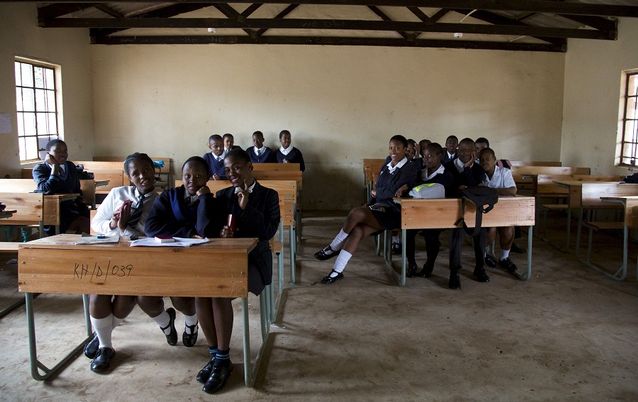FINANCE Minister Pravin Gordhan laid out admirable plans for continued growth in his budget speech, and says investment in education and other social services is an understandable development priority.
The additional R16.3bn for higher education and R50bn for basic education this year will add needed capital into the system. However, the government is not doing enough to incentivise the type of social investment that could stimulate our inclusive growth to make the National Development Plan’s (NDP’s) goals a reality.
In most of the world, the term social investment means the use of repayable finance to achieve a social and a financial return. This could be an investment in education, employment, healthcare, agriculture and other sectors – which are major challenges in SA.
The magnitude of these challenges far outweighs the public and philanthropic resources allocated to them and this is not unique to SA. At current investment levels (public and private) in sectors related to the United Nations’ Sustainable Development Goals (SDGs) in developing countries, there is an annual funding shortfall of $2.5-trillion.
There is great potential in using innovative financing approaches to catalyse more private capital towards investing in social issues. Investors, foundations, nongovernmental organisations, public-sector leaders, and intermediaries across the globe are dedicated to investing in positive social effects alongside financial returns.
The global sustainable investment market reached $21.4-trillion by the beginning of 2014. The most common sustainable investing strategy is negative or exclusionary screening, affecting $14.4-trillion in assets.
The second most prominent strategy is ESG (environmental, social and governance) integration — the systematic and explicit inclusion by investment managers of ESG factors into traditional financial analysis, which affects $12.9-trillion.
The global effect investing industry is estimated to be worth $60bn, based on a JPMorgan survey. These investments are channelled into financing early childhood education, innovations in clean technology, financial services for the poor and struggling middle class, and other effective areas.
According to the Bertha Centre for Social Innovation and Entrepreneurship’s 2015 African Investing for Impact Barometer, an estimated $6.2bn was allocated to affect investments in SA as at the end of December 2014, while $17.7bn was allocated to sustainability and SDG-themed investments.
These numbers are a drop in the ocean in comparison to the estimated $678bn invested by the South African investment industry as at the end of 2014.
Social investing stands poised for considerable growth in SA. The magnitude and speed of this growth depends on the extent to which the government creates an enabling environment through policy. Worldwide, social investment policy is most effective when it seeks to increase the supply of capital from wealth holders and managers, as well as the demand for capital by results-driven organisations.
...
THERE are many ways in which governments have used their positioning as a regulator and standard setter, but also as co-investor, risk mitigator, major buyer of goods and services, and as a market maker to exert significant influence on where and how investors place their funds.
In 2014, the Group of Eight (G-8) Social Investment Task Force published a set of policy recommendations that tackled the needs of the member countries, as well as disseminating globally generalisable ideas with which governments could engage.
Many developing countries have started to investigate and implement these ideas, with SA potentially being invited to join the Group of 20 Social Investment Task Force to share and collaborate.
SA has already started to develop a social investment market — revisions to Regulation 28 of the Pension Funds Act are exemplars of how policy can be used to leverage more investment towards social outcomes.
Building on the intent of Regulation 28, there are many more policy actions that have been used in developed and developing markets that could help pave the way for more social investment.
At the Bertha Centre, we have worked with global and domestic stakeholders to understand which policies could have a significant effect on the local social investment market.
Our suggestions include improving the enforcement and transparency of Regulation 28. One way would be to encourage the pension funds of state-owned enterprises to seek out socially and environmentally effective deals and investments and to publish the results of those investments so that the public can hold them to account.
This could be taken further into the private sector by creating an option for employees to invest a portion of their pension funds in social investment portfolios that support the growth of effective small and medium-sized enterprises (SMEs). Another option would be to expand the sustainable investment tenets of Regulation 28 into existing regulatory frameworks for banks, insurers and investment funds.
We suggest encouraging private sector investment through tax incentives for competent SMEs. Working groups of investors and philanthropists have made submissions to the South African Revenue Service about encouraging investment in high-impact ventures, including NeXii, SiMODiSA and the Independent Philanthropy Association. Although some recommendations have been adopted — such as the Section 12J amendments to the Income Tax Act, which has already resulted in hundreds of millions of rand raised for investment in SMEs — more of these concepts could be revisited in light of the Davis Tax Commission.
Funding windows could be created for social infrastructure projects. The Renewable Energy Independent Power Producer Procurement Programme has been a resounding success and Gordhan suggested expanding it into coal and gas power projects in his budget speech.
The government should explore creating funding windows similar to this programme for social infrastructure projects and involve the private sector early to ensure greater efficiencies and that the terms and conditions are fair and attractive.
Catalytic capital could be created through a social investment fund of funds. The set-up of such a fund with an accompanying technical assistance facility, could catalyse billions of rand for social investment.
The UK government’s Big Society Capital and its co-funders (including banks) have made more than £359m available to social sector organisations in the past three years in the form of loans and equity, which has resulted in the creation of jobs, social housing and many social outcomes.
The government has been exploring outcomes-based procurement in the form of social impact bonds (SIBs), which use private capital to test and scale promising social interventions.
...
THE government, along with private donors, commits to paying the investors back only when predetermined outcomes have been achieved, and independently verified. Worldwide, there are more than 50 SIBs worth more than $300m and the market is growing rapidly. With the progress already made towards procuring its first bonds, SA has the potential to lead the continent in this type of evidence-based policy. These recommendations are based on work done by many other think-tanks and social organisations in SA and come from a larger analysis conducted by our team that examines these options, how they fit within current policies, and how they could be applied to benefit the country.
With the leadership of forward-thinking policy makers, we can not only increase the efficiency and effect of public and philanthropic capital, but also accelerate and expand the volume of private investments towards social outcomes, helping to make the goals of the NDP a reality.
Policy makers in the G-8 and in emerging markets are embracing new investing tools that can augment traditional grant making. Building on successful models in housing, infrastructure, and other sectors can drive other investments.
SA has all the resources necessary to lead the continent in this movement and to show how the private and public sectors can work together to achieve common goals. Social investing is not a silver bullet — but it can catalyse more effective, proactive investment from public, private, and philanthropic coffers, and draw more interest in the targeting of social issues through investment.
• Patton is the innovative finance lead at the Bertha Centre for Social Innovation and Entrepreneurship, a specialised unit at the University of Cape Town’s Graduate School of Business

Education is a key area in which innovative social investment vehicles can improve outcomes for pupils and society while generating financial returns for investors. Picture: REUTERS
FINANCE Minister Pravin Gordhan laid out admirable plans for continued growth in his budget speech, and says investment in education and other social services is an understandable development priority.
The additional R16.3bn for higher education and R50bn for basic education this year will add needed capital into the system. However, the government is not doing enough to incentivise the type of social investment that could stimulate our inclusive growth to make the National Development Plan’s (NDP’s) goals a reality.
In most of the world, the term social investment means the use of repayable finance to achieve a social and a financial return. This could be an investment in education, employment, healthcare, agriculture and other sectors – which are major challenges in SA.
The magnitude of these challenges far outweighs the public and philanthropic resources allocated to them and this is not unique to SA. At current investment levels (public and private) in sectors related to the United Nations’ Sustainable Development Goals (SDGs) in developing countries, there is an annual funding shortfall of $2.5-trillion.
There is great potential in using innovative financing approaches to catalyse more private capital towards investing in social issues. Investors, foundations, nongovernmental organisations, public-sector leaders, and intermediaries across the globe are dedicated to investing in positive social effects alongside financial returns.
The global sustainable investment market reached $21.4-trillion by the beginning of 2014. The most common sustainable investing strategy is negative or exclusionary screening, affecting $14.4-trillion in assets.
The second most prominent strategy is ESG (environmental, social and governance) integration — the systematic and explicit inclusion by investment managers of ESG factors into traditional financial analysis, which affects $12.9-trillion.
The global effect investing industry is estimated to be worth $60bn, based on a JPMorgan survey. These investments are channelled into financing early childhood education, innovations in clean technology, financial services for the poor and struggling middle class, and other effective areas.
According to the Bertha Centre for Social Innovation and Entrepreneurship’s 2015 African Investing for Impact Barometer, an estimated $6.2bn was allocated to affect investments in SA as at the end of December 2014, while $17.7bn was allocated to sustainability and SDG-themed investments.
These numbers are a drop in the ocean in comparison to the estimated $678bn invested by the South African investment industry as at the end of 2014.
Social investing stands poised for considerable growth in SA. The magnitude and speed of this growth depends on the extent to which the government creates an enabling environment through policy. Worldwide, social investment policy is most effective when it seeks to increase the supply of capital from wealth holders and managers, as well as the demand for capital by results-driven organisations.
...
THERE are many ways in which governments have used their positioning as a regulator and standard setter, but also as co-investor, risk mitigator, major buyer of goods and services, and as a market maker to exert significant influence on where and how investors place their funds.
In 2014, the Group of Eight (G-8) Social Investment Task Force published a set of policy recommendations that tackled the needs of the member countries, as well as disseminating globally generalisable ideas with which governments could engage.
Many developing countries have started to investigate and implement these ideas, with SA potentially being invited to join the Group of 20 Social Investment Task Force to share and collaborate.
SA has already started to develop a social investment market — revisions to Regulation 28 of the Pension Funds Act are exemplars of how policy can be used to leverage more investment towards social outcomes.
Building on the intent of Regulation 28, there are many more policy actions that have been used in developed and developing markets that could help pave the way for more social investment.
At the Bertha Centre, we have worked with global and domestic stakeholders to understand which policies could have a significant effect on the local social investment market.
Our suggestions include improving the enforcement and transparency of Regulation 28. One way would be to encourage the pension funds of state-owned enterprises to seek out socially and environmentally effective deals and investments and to publish the results of those investments so that the public can hold them to account.
This could be taken further into the private sector by creating an option for employees to invest a portion of their pension funds in social investment portfolios that support the growth of effective small and medium-sized enterprises (SMEs). Another option would be to expand the sustainable investment tenets of Regulation 28 into existing regulatory frameworks for banks, insurers and investment funds.
We suggest encouraging private sector investment through tax incentives for competent SMEs. Working groups of investors and philanthropists have made submissions to the South African Revenue Service about encouraging investment in high-impact ventures, including NeXii, SiMODiSA and the Independent Philanthropy Association. Although some recommendations have been adopted — such as the Section 12J amendments to the Income Tax Act, which has already resulted in hundreds of millions of rand raised for investment in SMEs — more of these concepts could be revisited in light of the Davis Tax Commission.
Funding windows could be created for social infrastructure projects. The Renewable Energy Independent Power Producer Procurement Programme has been a resounding success and Gordhan suggested expanding it into coal and gas power projects in his budget speech.
The government should explore creating funding windows similar to this programme for social infrastructure projects and involve the private sector early to ensure greater efficiencies and that the terms and conditions are fair and attractive.
Catalytic capital could be created through a social investment fund of funds. The set-up of such a fund with an accompanying technical assistance facility, could catalyse billions of rand for social investment.
The UK government’s Big Society Capital and its co-funders (including banks) have made more than £359m available to social sector organisations in the past three years in the form of loans and equity, which has resulted in the creation of jobs, social housing and many social outcomes.
The government has been exploring outcomes-based procurement in the form of social impact bonds (SIBs), which use private capital to test and scale promising social interventions.
...
THE government, along with private donors, commits to paying the investors back only when predetermined outcomes have been achieved, and independently verified. Worldwide, there are more than 50 SIBs worth more than $300m and the market is growing rapidly. With the progress already made towards procuring its first bonds, SA has the potential to lead the continent in this type of evidence-based policy. These recommendations are based on work done by many other think-tanks and social organisations in SA and come from a larger analysis conducted by our team that examines these options, how they fit within current policies, and how they could be applied to benefit the country.
With the leadership of forward-thinking policy makers, we can not only increase the efficiency and effect of public and philanthropic capital, but also accelerate and expand the volume of private investments towards social outcomes, helping to make the goals of the NDP a reality.
Policy makers in the G-8 and in emerging markets are embracing new investing tools that can augment traditional grant making. Building on successful models in housing, infrastructure, and other sectors can drive other investments.
SA has all the resources necessary to lead the continent in this movement and to show how the private and public sectors can work together to achieve common goals. Social investing is not a silver bullet — but it can catalyse more effective, proactive investment from public, private, and philanthropic coffers, and draw more interest in the targeting of social issues through investment.
• Patton is the innovative finance lead at the Bertha Centre for Social Innovation and Entrepreneurship, a specialised unit at the University of Cape Town’s Graduate School of Business
























Change: 0.80%
Change: 0.61%
Change: -0.25%
Change: 0.13%
Change: 4.02%
Data supplied by Profile Data
Change: 1.13%
Change: 0.37%
Change: 0.80%
Change: 0.00%
Change: 0.33%
Data supplied by Profile Data
Change: -2.03%
Change: -1.51%
Change: -1.45%
Change: -2.26%
Change: -0.91%
Data supplied by Profile Data
Change: 0.07%
Change: 3.71%
Change: 2.65%
Change: 3.36%
Change: 4.99%
Data supplied by Profile Data